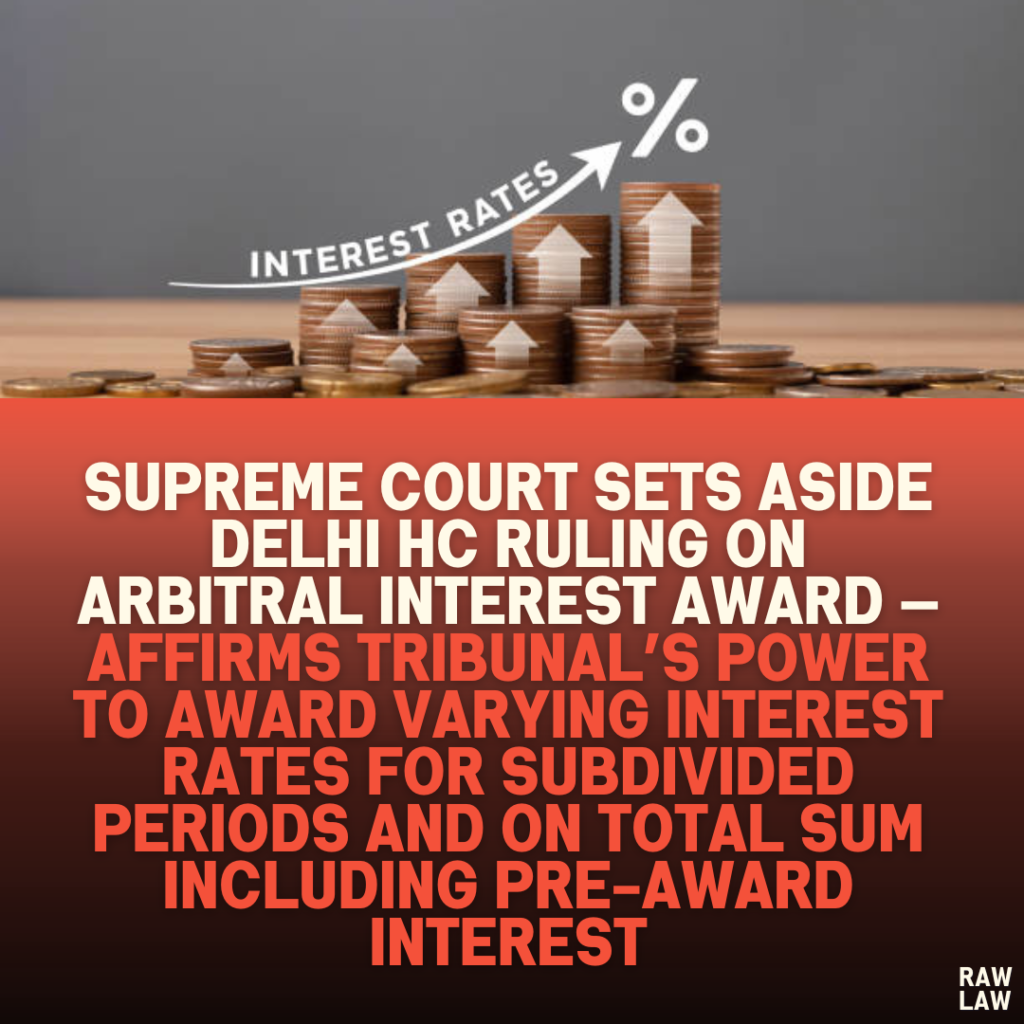Court’s Decision
The Supreme Court allowed the appeal, setting aside the judgments of both the High Court and the Commercial Court, which had annulled an arbitral award on the ground of lack of jurisdiction. The Court held that since no objection to jurisdiction under Section 16(2) of the Arbitration and Conciliation Act, 1996 was raised before the Tribunal, the award could not be annulled solely on that basis. Referring to its earlier decision in L.G. Chaudhary (II), the Court emphasized that:
“In such cases if no objection to the jurisdiction of the arbitration was taken at relevant stage, the award may not be annulled only on that ground.”
Facts
- The appellant entered into a works contract with the Madhya Pradesh Road Development Corporation for road rehabilitation projects in Madhya Pradesh.
- The contract included an arbitration clause governed by the Arbitration and Conciliation Act, 1996 (A.C. Act).
- A dispute arose regarding reimbursement for increased costs due to taxation changes. Arbitration was invoked, and the Tribunal awarded ₹1,03,55,187 with 10% interest.
- The respondent challenged the award under Section 34 of the A.C. Act but did not initially raise a jurisdictional objection.
- After judgments like L.G. Chaudhary (I) and Viva Highways, the respondent sought to introduce new grounds on jurisdiction, arguing the matter was governed by the MP Madhyastham Adhikaran Adhiniyam, 1983 (MP Act), not the A.C. Act.
- The Civil Court accepted the jurisdictional objection and set aside the award. The High Court affirmed this.
Issues
- Can an arbitral award passed under the A.C. Act, 1996 be annulled solely for lack of jurisdiction if no such objection was raised before the arbitral tribunal under Section 16(2)?
- Is there a conflict between L.G. Chaudhary (II) and Lion Engineering regarding when jurisdictional objections can be raised?
Petitioner’s Arguments
- The appellant argued that the arbitral proceedings were rightly conducted under the A.C. Act due to the arbitration clause in the contract.
- It relied on L.G. Chaudhary (II) and JMC Projects to contend that once an award is made, and no jurisdictional objection is raised before the tribunal, the award cannot be set aside on that ground.
- The appellant highlighted that the respondent had accepted the claim amount during arbitration, thus could not now challenge jurisdiction.
Respondent’s Arguments
- The respondent relied on the Full Bench decision in Viva Highways and the judgment in Lion Engineering to argue that objections regarding jurisdiction could be raised even under Section 34, post-award.
- It claimed the MP Act was the applicable law and not the A.C. Act.
Analysis of the Law
- The Court analyzed the special nature of the MP Act, 1983, a statute providing for statutory arbitration, and compared it with the general A.C. Act, 1996.
- It noted that under Section 2(4) of the A.C. Act, the provisions do not override other statutes unless inconsistent.
- The Court acknowledged earlier conflicting rulings (VA Tech, Anshuman Shukla, Ravikant Bansal) and explained that VA Tech was held per incuriam in L.G. Chaudhary (II).
Precedent Analysis
- In Anshuman Shukla, the Court held that the MP Act was a special legislation and excluded the A.C. Act where applicable.
- L.G. Chaudhary (I) and subsequently L.G. Chaudhary (II) affirmed the exclusive jurisdiction of the MP Arbitration Tribunal under the MP Act.
- Lion Engineering recognized that jurisdictional objections could be raised under Section 34.
- However, L.G. Chaudhary (II) carved out an exception: if no objection was raised before the Tribunal and an award was already passed, the award should not be annulled solely on jurisdictional grounds.
Court’s Reasoning
- The Court held that the respondent did not raise any jurisdictional plea before the Tribunal or initially in the Section 34 petition.
- The Supreme Court clarified that while Lion Engineering allows raising jurisdictional objections under Section 34, this does not override the exception in L.G. Chaudhary (II) where the award is already passed and no jurisdictional objection was taken earlier.
- It stated that JMC Projects correctly relied on L.G. Chaudhary (II) and that omission to consider Lion Engineering was inconsequential because it didn’t deal with the specific exception applicable post-award.
Conclusion
The Supreme Court allowed the appeal, restored the arbitral award in favour of the appellant, and held:
“The Tribunal’s award dated 08.07.2011 stands revived, and the objections under Section 34 on the ground of jurisdiction are not maintainable in view of the exception noted in L.G. Chaudhary (II).”
Implications
- This judgment solidifies the rule that jurisdictional objections under the A.C. Act must be raised at the appropriate stage, i.e., before or during arbitration under Section 16(2).
- Courts cannot set aside awards on jurisdictional grounds post-facto if no timely objection was raised.
- It prevents parties from using jurisdictional objections as an afterthought to invalidate otherwise binding awards.




Pingback: Bombay High Court Remands Appeals to Commissioner of Income Tax (Appeals) [CIT(A)] in Transponder Royalty Dispute: “Absence of Foundational Facts and Agreement Analysis Makes All Orders Non-Speaking” - Raw Law